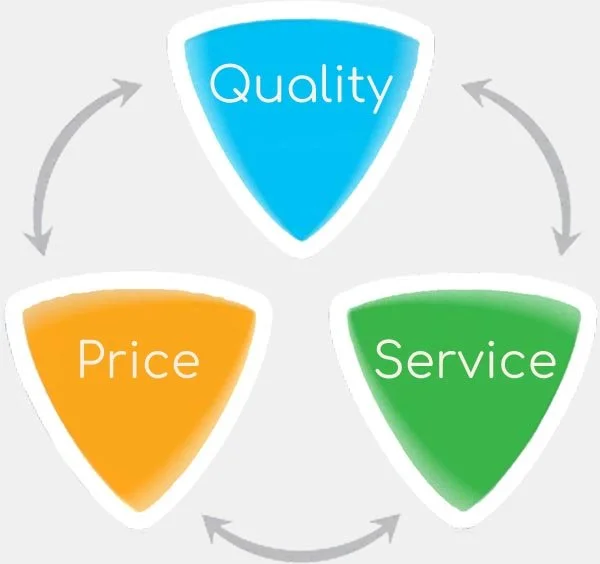Even the best managers need to rely on experts… knowing when to do so can make or break a company.
Have you ever taken your car to a mechanic because it started acting funny or was making a noise that didn’t sound quite right? If so, did you get an estimate that you thought seemed really expensive for the repair? Are you the type of person that just accepts that this is part of owning a car and pays to get the work done? Or are you the type that insists that it’s not that hard and chooses to do the work yourself? If the latter, was it as easy as you thought? Or did you realize those videos on Youtube make it look a lot easier than it really is after spending more on tools to do the work and being in pain for the next week recovering from scraping your knuckles after the multiple wrench accidents?
While many people believe that they’re capable of doing everything themselves, the reality is that it makes sense to let others do things for us. Sometimes it’s because we don’t have enough time to do everything, but other times it’s because other people have more knowledge and experience to get better results. When you’re running a business, you may not have time to learn something new. Moreover, the cost of doing certain things wrong often ends up costing more in time and money than it does in paying a subject matter expert (SME) to do it right the first time.
There are many different SMEs that can assist in business and many ways to acquire those skills. Sometimes it makes sense to hire a third party company to provide those skills or services while other times it makes sense to hire them directly. A lot of this depends on the size and budget of the company. Smaller companies will often outsource IT, marketing, or accounting tasks to an individual or agency. At a certain point it may make sense to bring at least part of that skill set in-house with an individual or even a department; however, many larger companies continue to outsource certain services because it makes better sense to do so.
Hiring an SME provides numerous benefits. Here are some key advantages:
Specialized Knowledge - SMEs possess in-depth, specialized knowledge in a particular field or industry. This expertise can offer valuable insights that may not be readily available within the organization.
Informed Decision-Making - Because they have a deeper understanding of the subject matter, SMEs can help businesses make more informed and strategic decisions, especially in cases where gaps or inaccurate information may not be identified by a non-expert.
Risk Mitigation - SMEs can identify potential risks associated with specific decisions and provide guidance on how to mitigate or manage those risks effectively. This proactive approach can enhance overall decision-making processes.
Cost Savings - Avoiding mistakes in the first place is almost always much cheaper than doing it wrong the first time and then having to pay more to correct a mistake, especially if that mistake may lead to years of continued inaccuracies.
Efficiency and Productivity - SMEs often streamline their processes and cut through unnecessary complexities because they’ve done things before. This helps make quicker, more efficient, and smarter decisions that promote better productivity.
Quality Assurance - SMEs help make better decisions by applying their expertise to assess the feasibility and viability of different options. This quality assurance is particularly important for critical business choices.
Problem-Solving - More experience makes SMEs better problem solvers and enables them to identify and implement effective solutions that may not be apparent to those without specialized knowledge. They can also help avoid problems in the first place by having seen mistakes that others have made.
Training and Development - SMEs can assist in the training and development of staff by sharing their knowledge and expertise. This helps build internal capabilities and ensures that the organization remains competitive in its industry.
Innovation and Creativity - SMEs can bring innovative and creative ideas to the table, drawing from their deep understanding of the subject matter. This can be particularly beneficial when exploring new business opportunities or addressing unique challenges.
Industry Connections - SMEs often have extensive networks within their industry. Leveraging these connections can open doors to valuable partnerships, collaborations, and market insights that can inform decision-making while also accelerating the pace of business.
Adaptability to Change - SMEs can help businesses adapt to changes in their industry by staying abreast of the latest trends, technologies, and regulatory developments. This adaptability is crucial for staying competitive in dynamic markets.
Time Recovery - Utilizing SMEs to assist with certain business functions or assist in making substantial business improvements allow the management of the company to focus on their responsibilities and achieve more.
The expertise provided by subject matter experts enhances decision-making processes, reduces risks, and contributes to the overall success and competitiveness of a business. Integrating SME input into key decisions is a strategic approach that can yield significant benefits over time. And yes, while there may be sticker shock at paying an expert, the cost of hiring an amateur or doing it yourself often ultimately costs far more.
- John Thrush





